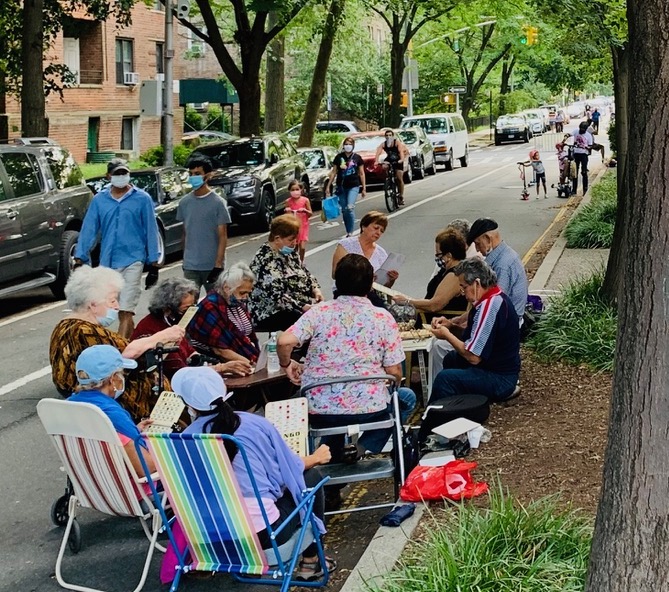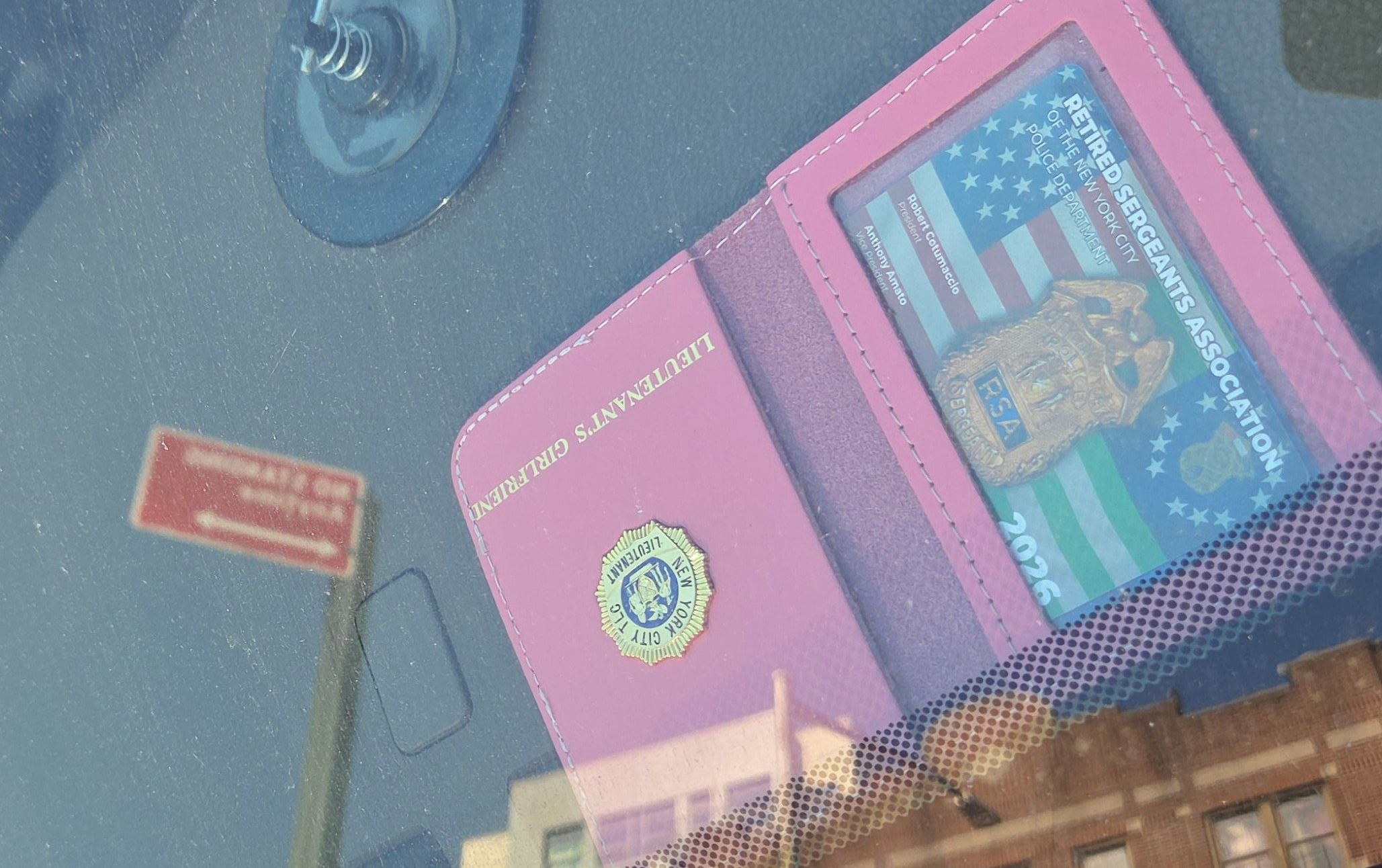A Queens council member has jumped on the popular effort to turn the city's best open street into a "permanent public space for the community" — the first salvo in a debate that will likely grow to include other neighborhoods that don't want to lose their well-used gathering places once the COVID-19 pandemic subsides.
In calling for permanence, Council Member Danny Dromm cited "overwhelming positive response" from residents of Jackson Heights and Corona, whose neighborhood is second-to-last in per capita open space. He also cited the "wonderful impact" the open street between 69th Street and Junction Boulevard has had.
"Children from the surrounding cramped apartments safely propel their scooters down the street," he wrote. "A small group takes a salsa dance lesson in the open. Two older women pull out lawn chairs and bask in the sun."
The benefits go far beyond those three constituencies. Whether by kismet or design, the de Blasio administration's 34th Avenue open street has long been described as the best one in the city — and several factors make it so: It runs entirely through a residential neighborhood with very little open space; it is parallel to the much busier Northern Boulevard, which provides drivers with a better route than a residential street; it has the strong support of volunteers who put out barricades every morning and remove them at night; it is very widely used by pedestrians, which deters drivers from using the roadway for local trips.
Make Jackson Heights' 34th Avenue Open Street permanent @NYCMayor @NYC_DOT pic.twitter.com/5vl3MbMyCa
— Daniel Dromm (@Dromm25) September 10, 2020
Dromm's letter was partly responding to a massive effort to focus attention on this particular open street. Earlier this summer, Streetsblog covered the initial failure of the project, which succumbed to the weight of overpolicing by the NYPD, only to become a uniquely popular space after cops stood down.
Next, Streetfilms got both Dromm and State Senator Jessica Ramos to commit to the permanent car-free proposal. And Transportation Alternatives started a petition drive shortly thereafter — one that has already garnered 1,236 signatures (it's online if you want to sign it). People who have volunteered to gather petitions have noticed how eager residents are to sign.
"Being out on the street asking my neighbors to sign the petition is the best volunteer gig I've ever had," said Angela Stach, who lives in Jackson Heights and has been collecting signatures for several weeks. "There is literally no need to explain why the city needs to make this open street permanent — because it's completely self-evident. It has brought joy to our neighborhood during a very traumatic time, especially for the kids. And people really want to hold on to that. It's almost surreal how easy it is to have these conversations with neighbors who have never before considered that the way in which cars monopolize public space is not the 'natural' order of things."
Stach believes that unlike other public space battles in her neighborhood, this one will be easier to win because people can see the benefits, rather than have to imagine them, as in the case of a new bike lane or residential loading zone that hasn't been created yet.
"Having experienced how the open street has transformed our everyday lives has dramatically broadened the constituency for challenging the dominance of cars in our community," she said.
We want to thank the @NYCMayor @NYC_DOT and our supportive local elected officials for opening 34th Avenue in the first place. It’s been an amazing resource for our neighborhoods now let’s extend it to 114th & make it permanent. https://t.co/btkPillE4b
— JimRockaway (@JimRockaway) July 31, 2020
One of the main organizers of the volunteer effort, Jim Burke, added that the community involvement was the key.
"Many of us came together to demand open streets and then to open and close them together each morning and each evening," he said. "We were hungry for connections, for exercise, for space and fresh air. Thirty-fourth Avenue enables all of that. So many of our neighbors plant the medians, clean the avenue and make sure drivers respect our open streets."
That's not to say Jackson Heights and Corona residents are all holding their hands in a Kumbaya moment for a car-free roadway. The neighborhood is home to many car owners who have expressed frustration to petitioning volunteers and on a neighborhood Facebook page about how difficult it is for them to find free storage for their private vehicles.
Others point out that there are many schools on the strip — then make the counter-intuitive point that a car-free street is somehow more dangerous for the school-age pedestrian commuters.
"There are many schools on 34th Avenue, therefore weekdays, it should not be a permanent walk way," wrote Barbara Goldman. "Also, it makes it difficult for teachers to find parking."
Another resident, who gave the name Nina Starz, gave the Marie Antoinette response: Let them move to the suburbs!
"I'm sorry, I understand that people want outdoor areas, but if that's the case consider moving out of the city," she wrote. "You have so many sidewalks to walk your little hearts away, so it is not fair to limit traffic for cars when you have much space to walk."
Many residents responded back that sidewalks represent a tiny fraction of the neighborhood's public space — and are certainly no replacement for true open space in a neighborhood with but one central gathering place, the small Travers Park.
"We are so grateful for the open road!" wrote Rebecca Mehan. "With two young kids, it is difficult to stay inside all day. The open road gives us a safe place to walk/run/scoot/bike outside without needing to leave the neighborhood. Moreover, it connects us with our community . It is so uplifting to see and move with all of our neighbors. We will use it in the heat, rain, and snow. I hope it can remain open to pedestrians long past our current situation."
Meanwhile, the debate over 34th Avenue will likely grow to include other neighborhoods. In Inwood, for example, a local mom got 600 signatures on her petition to restore Margaret Corbin Drive to car-free status after the city unceremoniously ended the open-street program there in August. And members of Community Boards 2 and 4, which cover adjoining sections of the West Side and Lower Manhattan, have long advocated for more streets to be made off limits to cars.
Meanwhile, several groups are working on petitions calling for the open streets on Avenue B in Manhattan and Berry Street in Brooklyn to be permanently car-free.
The Meatpacking Business Improvement District showed off what such a street could look like this weekend — to rapturous support from residents, visitors and local businesses, as Streetsblog reported.
The Department of Transportation did not respond directly to Dromm's letter, but told Streetsblog in an anodyne statement, "We are excited about the success of the open street, and we look forward to working with the community on the future of 34th Avenue."
Here is Streetfilms' video from earlier this summer:






